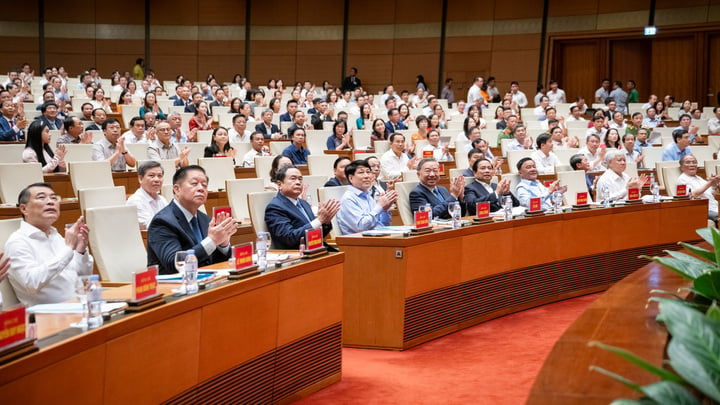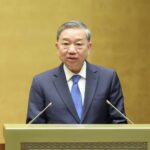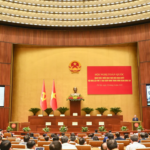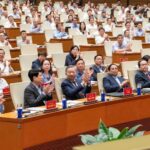In his directive speech at the National Conference on the promulgation and implementation of Resolutions 66 and 68 of the Politburo on May 18, General Secretary To Lam referred to the concept of the “Big Four Pillars” to help the country take off.

Party, State leaders and delegates attending the National Conference on the promulgation and implementation of Resolutions 66 and 68 of the Politburo. (Photo: Pham Thang)
The “Big Four Pillars” include: Resolution 57 of the Politburo on breakthrough development in science, technology, innovation, and national digital transformation; Resolution 59 of the Politburo on international integration in the new context; Resolution 66 of the Politburo on innovation in law-making and enforcement to meet the requirements of national development in the new era; and Resolution 68 of the Politburo on private sector development.
General Secretary To Lam acknowledged that these four major resolutions of the Politburo collectively form a unified whole in terms of both thought and strategic action for national development in the new era. Despite each resolution focusing on a specific critical area, they are closely interconnected and mutually reinforcing in the process of promulgation and implementation.
Breakthrough in Science, Technology, and Innovation
Resolution 57, issued by the Politburo on December 22, 2024, emphasizes that the development of science, technology, innovation, and digital transformation is a decisive factor for the progress of nations. It represents the best opportunity for Vietnam to become a powerful and prosperous country in the new era – an era of national advancement.
The resolution sets out clear goals for the year 2030. By then, Vietnam aims to have its scientific and technological potential, as well as its innovation capabilities, reach advanced levels in many important fields, ranking among the leading upper-middle-income countries. The technological and innovative capabilities of enterprises are expected to be above the world’s average level. Additionally, Vietnam aims to be among the top countries in specific scientific and technological fields.
By 2030, Vietnam aims to be among the top three countries in Southeast Asia and the top 50 countries globally in terms of digital competitiveness and e-government development index. It also aims to be among the top three countries in the region for artificial intelligence research and development and the development of select digital technology industries where Vietnam has a competitive advantage. The resolution further aims for a minimum of five technology enterprises on par with advanced countries.
Looking ahead to 2045, the resolution envisions a solid foundation in science, technology, innovation, and digital transformation, contributing to Vietnam’s transformation into a developed and high-income country. Vietnam aims for a digital economy contributing a minimum of 50% of its GDP and to become one of the region’s and the world’s leading centers for digital technology industries. The resolution also aims for Vietnam to be among the top 30 countries in the world in terms of innovation and digital transformation.
By 2045, Vietnam aims to have a ratio of technology enterprises comparable to that of developed countries, with a minimum of 10 technology enterprises on par with advanced countries. It also aims to attract at least five additional leading global technology organizations and enterprises to establish headquarters or invest in research and production in Vietnam.
International Integration in the New Context
Resolution 59 was promulgated by the Politburo against a backdrop of rapid and complex international changes, increasing strategic competition among major powers, a clear multipolar and multi-centric trend, and global challenges such as climate change, pandemics, and non-traditional security issues. The Fourth Industrial Revolution, digital transformation, and green economy are also profoundly transforming the global development model.
The adoption of Resolution 59 marks a historic turning point in the country’s international integration process, positioning integration as a strategic driver for Vietnam’s confident step into the new era. The resolution demonstrates a profound vision: international integration is not merely about opening up and exchanging but is a comprehensive endeavor that demands proactiveness, assertiveness, and strong resolve.
A consistent viewpoint throughout the resolution is that international integration is a cause of the entire nation, under the absolute, direct, and comprehensive leadership of the Party and the unified management of the State, with the people and businesses as the focus and creative subjects.
The resolution provides comprehensive and profound strategic orientations, such as promoting integration in tandem with building an independent, self-reliant, and modern economic structure; developing a digital, green, and circular economy; and enhancing competitiveness based on science, technology, and innovation.
In the political, defense, and security realms, integration goes hand in hand with strengthening strategic partnerships and comprehensive relationships, enhancing political trust, and safeguarding national independence, sovereignty, and a peaceful and stable environment for the country.
In the fields of science, technology, education, healthcare, and the environment, integration is leveraged to elevate the country’s standards, develop high-quality human resources, and deeply integrate into global value chains.
A particularly important and foundational aspect of the resolution is the development of a strong contingent of international integration officials.
Innovation in Law-Making and Enforcement
Resolution 66 underscores that fundamental innovation in law-making and enforcement is the core and foundation for building a socialist rule-of-law state in Vietnam in the new era.
Regarding guiding viewpoints, the resolution emphasizes that law-making and enforcement must become a central and regular task for the entire Party and political system, closely linked to the requirements of rapid and sustainable national development. Additionally, laws must be consistent, feasible, transparent, stable, and based on development realities while also being forward-looking and proactive in leading development rather than merely reactive.
Based on these viewpoints, three key tasks are outlined: perfecting the institutional framework in critical areas such as a streamlined and efficient state apparatus, a socialist-oriented market economy, protection of human rights, and a healthy and competitive business environment; innovating the law-making process to be more proactive and creative, ensuring the consistency, specificity, ease of understanding, and enforceability of laws; and enhancing the effectiveness of law enforcement, strengthening discipline and order in the implementation process, and linking power with accountability.
Private Sector as the Most Important Driver of the Economy
Resolution 68 represents a significant advancement in the theoretical thinking and practical leadership of the Party: “In a socialist-oriented market economy, the private sector is the most important driver of the national economy.”
Resolution 68 sets the goal that by 2030, the private sector will be the most important driver of the national economy and the vanguard in the development of science, technology, innovation, and digital transformation, contributing to the successful realization of Resolution 57 and other Party guidelines and policies.
The resolution aims for two million enterprises operating in the economy, with 20 enterprises per thousand people. At least 20 large enterprises are expected to participate in global value chains.
The targeted average growth rate for the private sector is about 10-12% per year, higher than the overall economic growth rate, contributing approximately 55-58% of GDP, about 35-40% of the total state budget revenue, and providing employment for about 84-85% of the total labor force. Labor productivity is expected to increase by an average of about 8.5-9.5% per year.
In terms of technological and innovative capabilities, digital transformation, and innovation, the resolution aims for Vietnam to be among the top three countries in ASEAN and the top five in Asia.
By 2045, the Politburo’s resolution envisions a vibrant, robust, sustainable, and proactive private sector in global production and supply chains, with high competitiveness in the region and internationally. It aims for a minimum of three million enterprises operating in the economy, contributing over 60% of GDP.
The Ultimate Solution for the North-South High-Speed Rail
“The North-South high-speed railway project is a testament to the power of technology and human resource networks. This ambitious endeavor intertwines various industries, including construction, metallurgy, precision engineering, digital innovation, signaling, and control systems. By harnessing the potential of cutting-edge technology and a skilled workforce, we lay the golden tracks for initial success and pave the way for a brighter future.”
Over 1.5 Million Delegates Attend National Conference to Propagate and Implement Resolutions 66 and 68
“On Monday, May 18th, the Political Bureau and the Secretariat held a nationwide conference to promulgate and implement Resolution No. 66-NQ/TW, dated April 30, 2025, issued by the Political Bureau regarding the innovation of legal construction and enforcement to meet the country’s development demands in the new era. Additionally, they also discussed Resolution No. 68-NQ/TW, dated May 4, 2025, which focuses on the development of the private economy.”
“The Address by General Secretary To Lam at the National Conference to Propagate and Implement the Resolutions of the Politburo”
“VnEconomy is honored to present the full text of General Secretary To Lam’s speech at the national conference to propagate and implement Resolution 66-NQ/TW and Resolution 68-NQ/TW of the Politburo. These pivotal resolutions are set to chart a new course for Vietnam’s future, and General Secretary To Lam’s insights offer a profound understanding of their significance.”





















